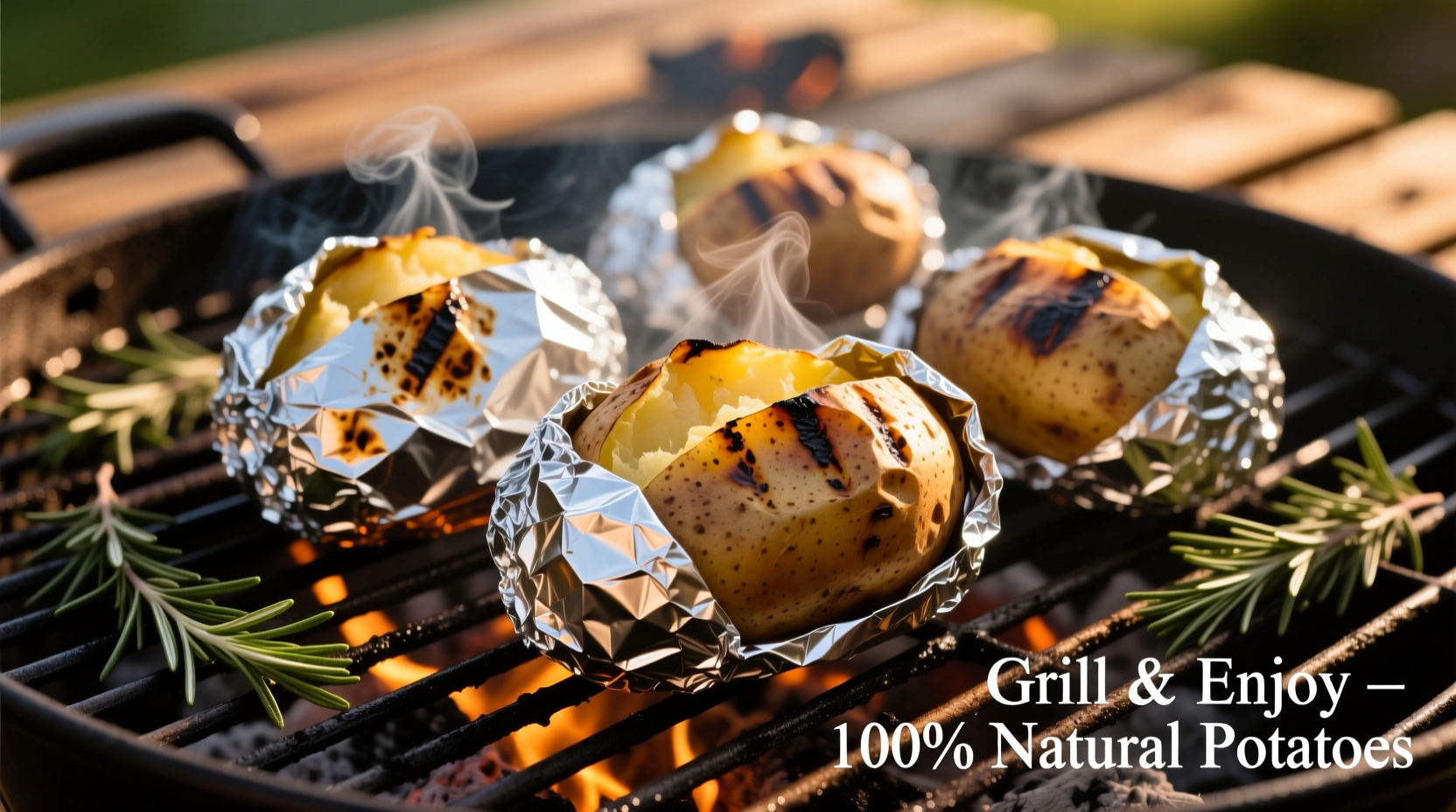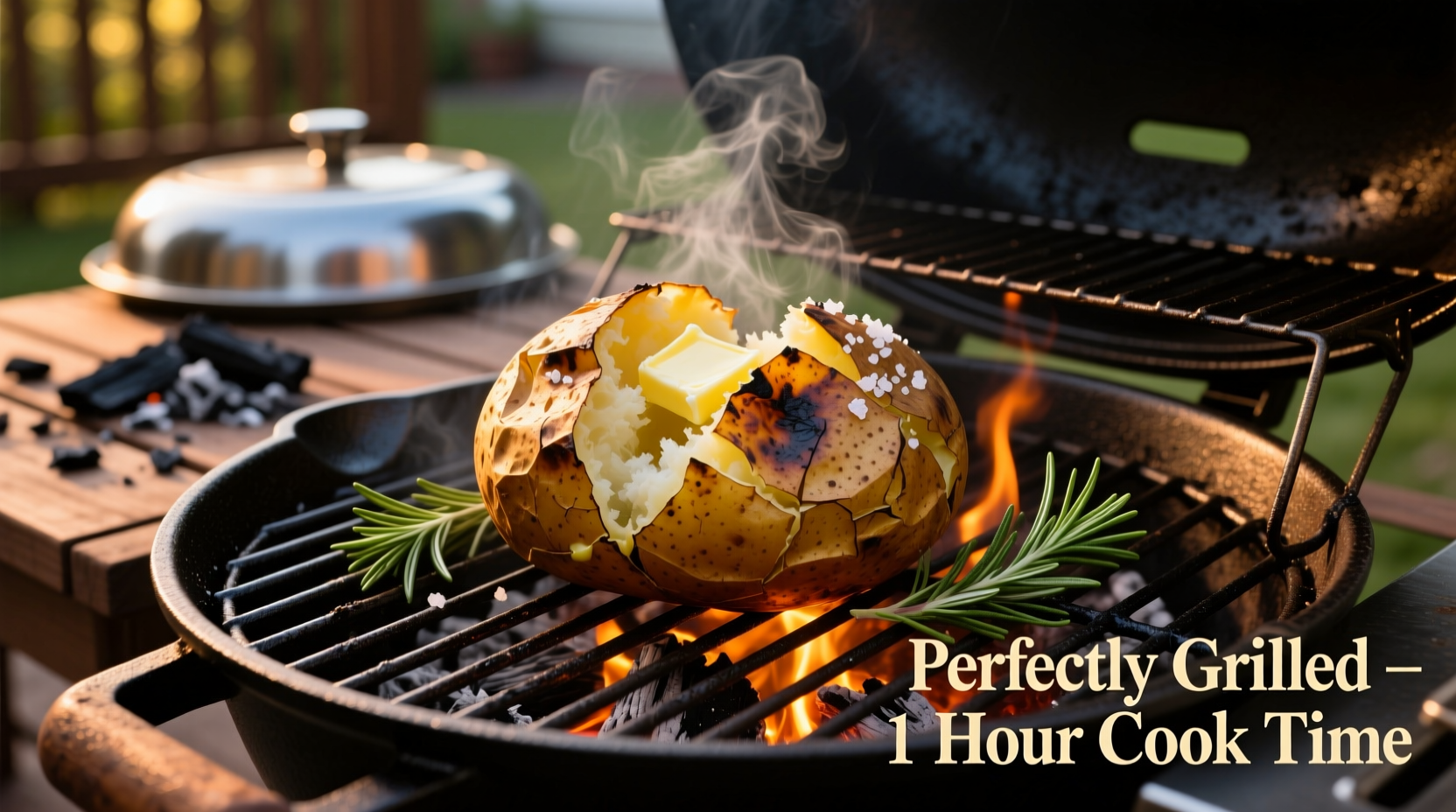Perfect BBQ baked potatoes take 45-60 minutes at 350-400°F, wrapped in foil with olive oil and salt. Prick skins before cooking, rotate halfway through, and check doneness with a fork—they're ready when tender with fluffy interiors and slightly crisp skins.
There's nothing quite like the smoky aroma of perfectly cooked baked potatoes straight from the barbecue. Forget oven-only methods—cooking potatoes on your BBQ unlocks a subtle wood-infused flavor while freeing up indoor kitchen space. Whether you're hosting a summer cookout or simply want that authentic outdoor cooking experience, this guide delivers restaurant-quality results with foolproof timing and pro techniques.
| Potato Size | BBQ Temp | Cooking Time | Internal Temp |
|---|---|---|---|
| Medium (6-8 oz) | 350-400°F | 45-55 minutes | 205-210°F |
| Large (10-12 oz) | 350-400°F | 55-65 minutes | 205-210°F |
| Russet vs Sweet | Same temp | +10-15 minutes for sweet | 190°F for sweet |
Why BBQ Beats the Oven for Baked Potatoes
Cooking potatoes on your barbecue isn't just convenient—it creates a unique flavor profile you can't achieve indoors. The indirect heat circulation mimics professional convection ovens while imparting subtle smokiness from wood chips or charcoal. According to USDA food safety guidelines, maintaining consistent temperatures between 350-400°F ensures potatoes reach the safe internal temperature of 205°F needed for perfect texture without drying out.
Unlike oven cooking, BBQ methods allow you to simultaneously prepare multiple dishes using different heat zones. Position potatoes over indirect heat while meats cook directly over flames—a technique professional chefs use to maximize grill efficiency during large gatherings.
Step-by-Step Preparation Process
Selecting the right potatoes makes or breaks your BBQ results. Russets remain the gold standard for fluffy interiors, but Yukon Golds offer buttery richness that holds shape better. Avoid waxier varieties like red potatoes which become gummy when baked. Always choose firm, blemish-free specimens about the same size for even cooking.
Cleaning and prepping requires attention to detail. Scrub potatoes thoroughly under cold water using a vegetable brush—never peel, as the skin protects moisture and adds texture. Dry completely with paper towels; moisture creates steam pockets that cause foil to tear. Prick each potato 8-10 times with a fork to release steam pressure—this critical step prevents dangerous explosions during cooking.
Seasoning and wrapping transforms basic potatoes into culinary highlights. Rub skins with 1 tsp olive oil per potato, then sprinkle with coarse salt. For flavor variations, add garlic powder or smoked paprika before wrapping. Use heavy-duty foil folded double-layered, shiny side in, to create airtight packets. Leave minimal airspace inside—the trapped steam cooks potatoes evenly while preventing burning.

Optimal BBQ Setup and Cooking Technique
Proper grill configuration separates good from great results. For charcoal grills, arrange coals to one side creating indirect heat zone; for gas grills, turn off burners beneath where potatoes will sit. Maintain steady 350-400°F by monitoring with a reliable thermometer—fluctuations cause uneven cooking. Never place foil packets directly over flames; this creates hot spots that burn exteriors while interiors remain raw.
The cooking process requires minimal intervention but precise timing. Place foil packets seam-side up on the cooler grill section. Rotate 180 degrees halfway through cooking to counteract any temperature inconsistencies. Check doneness at minimum time by carefully opening one packet—insert a fork; it should slide in with no resistance. Undercooked potatoes feel dense, while overcooked ones collapse when touched.
Weather considerations significantly impact BBQ cooking. On windy days, position potatoes away from direct airflow which cools cooking zones. In temperatures below 60°F, expect 15-20% longer cooking times as the grill works harder to maintain heat. These environmental factors explain why indoor oven times don't directly translate to outdoor cooking—a crucial detail often overlooked in amateur guides.
Finishing Touches for Restaurant-Quality Results
Resting time makes a surprising difference in texture. Let potatoes sit in foil packets for 5-7 minutes after removing from heat—this allows residual steam to finish cooking interiors while redistributing moisture. Skipping this step causes fillings to sink when cut open.
Serving techniques elevate simple potatoes into showstoppers. Make a deep cross-shaped slit in the top, then press corners inward to create a natural bowl. For classic presentation, top with sour cream, chives, and bacon bits. Adventurous cooks can stuff with cheese mixtures or chili—just add fillings during the last 10 minutes of cooking to maintain structural integrity.
Advanced Variations and Troubleshooting
Master these pro techniques for next-level results. Try the "half-bake" method: microwave potatoes 5 minutes before grilling to reduce cooking time by 25% while preserving smoky flavor. For crispy skins, unwrap during the final 5 minutes and brush with melted butter. Sweet potatoes require lower temperatures (325°F) and longer cooking—aim for 190°F internal temperature to prevent caramelization burn.
Troubleshooting common issues: If potatoes remain hard after recommended time, check grill temperature—most failures stem from inadequate heat. For soggy skins, reduce oil quantity or skip wrapping entirely (requires careful temperature monitoring). When cooking multiple sizes, place larger potatoes near heat sources and rotate positions periodically. Always verify doneness with a thermometer rather than relying solely on time estimates.
Frequently Asked Questions
Can I cook potatoes directly on grill grates without foil? Yes, but requires careful temperature control below 350°F. Clean and oil grates thoroughly, turn potatoes every 15 minutes, and expect slightly crispier skins with more rustic presentation. This method works best with smaller potatoes under 8 ounces.
How do I prevent potatoes from drying out? Proper oiling and airtight wrapping are essential. Use 1 tsp oil per potato and ensure foil packets have minimal airspace. For extra moisture retention, add 1 tsp water inside each packet before sealing. Avoid overcooking—remove potatoes immediately when they reach 205-210°F internal temperature.
What's the best wood for smoky flavor? Apple or cherry wood chips provide subtle sweetness that complements potatoes without overpowering. Soak chips 30 minutes before adding to charcoal or smoker box. For gas grills, use small smoke packets made from foil with 2 tbsp chips. Stronger woods like hickory work better with meats than delicate potatoes.
Can I prepare potatoes ahead of time? Partial preparation is possible—wash, prick, and oil potatoes up to 24 hours ahead, storing unwrapped in refrigerator. Complete wrapping immediately before grilling. Fully cooked potatoes can be held in保温 (warm) foil for up to 45 minutes, but texture degrades beyond that point. Never fully cook potatoes in advance then reheat—they become waterlogged.











 浙公网安备
33010002000092号
浙公网安备
33010002000092号 浙B2-20120091-4
浙B2-20120091-4